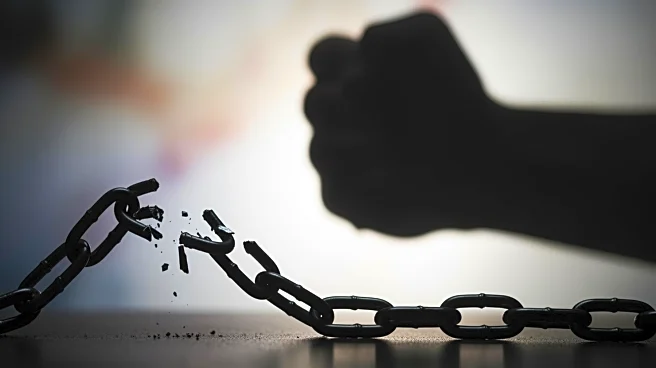What's Happening?
Israel has issued a warning to increase its military actions against Hezbollah in southern Lebanon if the Lebanese government does not disarm the militant group. This development comes despite an existing ceasefire agreement mediated by the United States
and France. Israeli Prime Minister Benjamin Netanyahu stated that Hezbollah is attempting to rearm, and Israel will act in self-defense to prevent Lebanon from becoming a renewed front against it. Netanyahu emphasized that while Israel reports to the United States, it does not seek permission for its security actions. The Israeli military confirmed the killing of four Hezbollah members, continuing its operations against the group despite the ceasefire. The ceasefire, established in November of the previous year, has not halted Israeli strikes, which are justified by Israel as necessary actions against Hezbollah militants and facilities. Lebanese officials have criticized these strikes for harming civilians and infrastructure unrelated to Hezbollah, arguing that they provide Hezbollah with a pretext to retain its weapons.
Why It's Important?
The ongoing conflict between Israel and Hezbollah has significant implications for regional stability in the Middle East. Israel's actions and threats to intensify strikes could escalate tensions, potentially drawing in other regional powers and affecting international relations. The situation poses a risk to civilian lives and infrastructure in Lebanon, as evidenced by the reported casualties and damage. The conflict also highlights the challenges of enforcing ceasefire agreements and the complexities of disarmament in volatile regions. The Lebanese government's inability to disarm Hezbollah could lead to further instability and undermine efforts for peace. Additionally, Israel's stance of acting independently of U.S. approval underscores its commitment to national security, which could influence its diplomatic relations with the United States and other allies.
What's Next?
The situation may lead to increased diplomatic efforts by international stakeholders to prevent further escalation. The Lebanese government faces pressure to address Hezbollah's armament, which could involve negotiations or international intervention. Israel's continued military actions might provoke responses from Hezbollah, potentially leading to renewed conflict. The international community, particularly the United States and France, may need to reassess their roles in mediating the ceasefire and supporting peace efforts. Monitoring the situation closely will be crucial for anticipating further developments and mitigating risks of a broader conflict.
Beyond the Headlines
The conflict raises ethical and legal questions about military actions in civilian areas and the responsibilities of state and non-state actors in conflict zones. The humanitarian impact on Lebanese civilians, including casualties and infrastructure damage, highlights the need for international humanitarian law compliance. The situation also reflects broader geopolitical dynamics in the Middle East, where proxy conflicts and regional power struggles complicate peace efforts. Long-term, the conflict could influence regional alliances and the balance of power, affecting future diplomatic and military strategies.
















